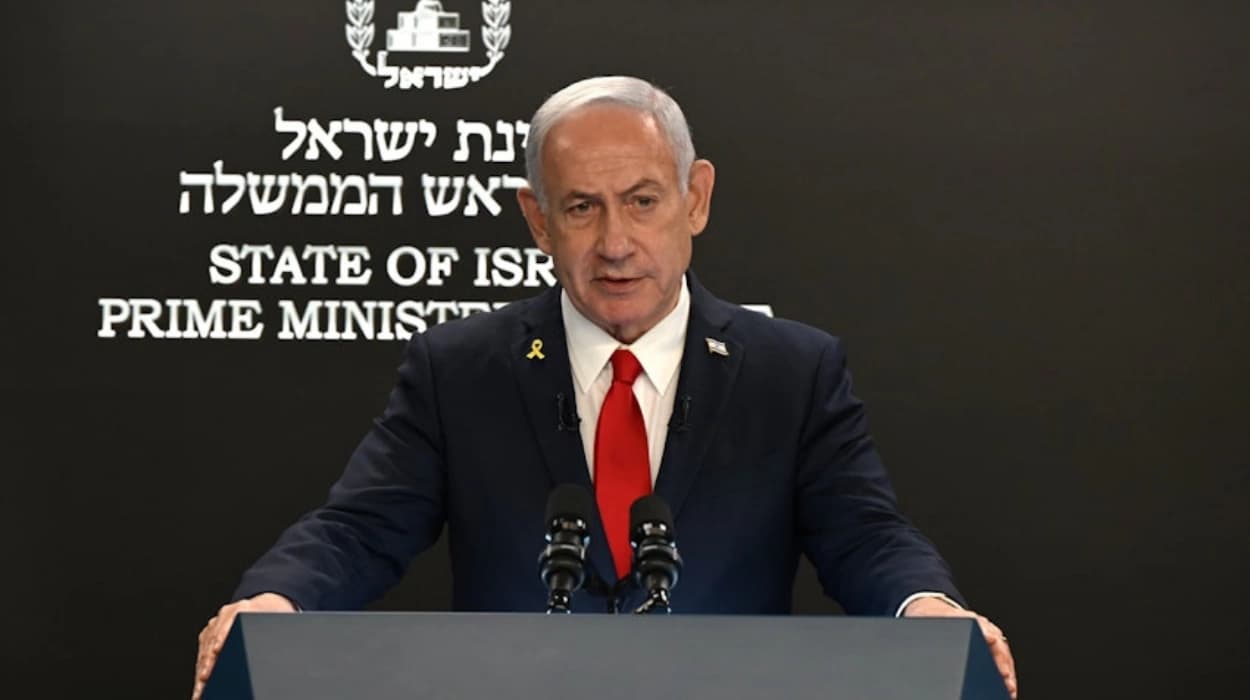Israeli Prime Minister Benjamin Netanyahu's public
endorsement of the "Greater Israel" vision—an expansionist ideology
advocating Israeli control over vast Arab territories—has sparked widespread
outrage across Iraq and the broader Arab and Islamic world. This declaration
has been condemned as a violation of international law and a serious threat to
regional stability and Palestinian statehood.
Netanyahu’s Open Affirmation of the Greater Israel Vision
In a revealing interview with Israel's i24 News channel,
Israeli Prime Minister Benjamin Netanyahu declared that he is "on a
historic and spiritual mission" deeply connected to the vision of
"Greater Israel." When interviewed by Sharon Gal, former right-wing
member of the Knesset, Netanyahu emphatically affirmed his alignment with the
concept, responding "Very much" when asked if he connected to the
vision. He described his role as safeguarding the state for future generations,
invoking the legacy of his parents' generation that established Israel, and
urging his generation to ensure its continued existence. He accepted an amulet
depicting the "Promised Land," indicating the geographic and symbolic
representation of this vision (as reported by Sharon Gal of i24 News).
The concept of "Greater Israel" is grounded in
Revisionist Zionism and includes territories beyond current Israeli
borders—encompassing the West Bank, Gaza Strip, East Jerusalem, and parts of
neighbouring countries such as Egypt, Jordan, Syria, Lebanon, and Iraq. Some
interpretations extend boundaries further to include parts of Kuwait, SaudiArabia, and Turkey. This expansionist agenda was historically invoked after
Israel's territorial gains following the 1967 Six-Day War (detailed by Stephen
Prager of Common Dreams and others).
Arab and Islamic Nations Unite in Strong Rejection
The reaction across the Arab and wider Islamic world has been swift and overwhelmingly critical. A coalition of 31 Arab and Islamic states, including the Arab League, the Organisation of Islamic Cooperation, and the Gulf Cooperation Council, issued a joint statement condemning Netanyahu's remarks as a
"blatant threat to Arab national security and state sovereignty."
The statement denounced the expansionist rhetoric for
violating international law, including explicit references to United Nations
resolutions, and warned that it jeopardizes regional stability, peace, and
global security (as reported by Al Jazeera and Anadolu Agency).
Egypt's Foreign Ministry demanded clarifications from Netanyahu,
urging a return to negotiations and peace efforts based on the two-state
solution with a Palestinian state on the 1967 borders, including East Jerusalem
as its capital. Egypt considered Netanyahu's vision a destabilising provocation
undermining regional peace (Arab American News, Arab News).
Saudi Arabia's government strongly condemned the
"Greater Israel" policy, reaffirming its support for Palestinian
rights and rejecting all forms of expansionism. The Saudi Cabinet and Foreign
Ministry publicly warned that such expansionist ambitions represent a serious
danger to peace and security across the Middle East (Arab News, South China
Morning Post).
Jordan categorised Netanyahu's statements as a
"dangerous and provocative escalation," rejecting what it called
extremist and illusory visions. Qatar labelled the remarks as "arrogant
and destabilising," reiterating its support for Arab nations' sovereignty
(YouTube news coverage, Arab American News).
Palestinian Authority and Hamas Responses
The Palestinian Authority strongly condemned Netanyahu’s
endorsement of Greater Israel, interpreting it as a direct threat to
Palestinian sovereignty and a continuation of occupation policies. Hamas echoed
these sentiments, describing Netanyahu's statements as incitement and a
manifestation of arrogance that threatens peace efforts. Both entities
emphasised that such rhetoric undermines efforts for a viable Palestinian state
and escalates tensions (Arab American News, People's Dispatch).
Iraq’s Outrage and Renewed Regional Tensions
Iraq has reacted with particular indignation to Netanyahu’s
remarks. Iraqi officials and social media users expressed outrage, framing Netanyahu’s
vision as a direct threat to Iraq's territorial integrity and sovereignty. The
inclusion of Iraqi territories in some interpretations of "Greater
Israel" has resurfaced long-standing fears in Baghdad about foreign
incursions and destabilisation efforts in the region. Additionally, Iraqi
discourse on social platforms increased accusations against Kurdish groups,
reflecting the heightened sensitivities ignited by Netanyahu’s statements
(Amwaj Media, Kayhan).
Wider Implications and Analysis
Historic Context and Ideological Roots
The "Greater Israel" concept originates from early
20th-century Revisionist Zionism, a movement founded by Ze’ev Jabotinsky
championing Jewish sovereignty secured by force if necessary. The ideology
contrasts with more diplomatic or negotiated approaches to territorial
disputes, embodying a maximalist expansionist doctrine. It has been associated
with paramilitary groups and far-right Israeli factions advocating the
annexation and control of vast Arab lands, including the West Bank and Gaza,
and sometimes beyond (People's World, Majalla).
Concerns Over Regional Destabilisation
Experts and analysts warn that Netanyahu’s public embrace of
Greater Israel may shift Israel's image starkly from a Western ally balancing
Iran to a primary source of instability. The expansionist rhetoric risks
alienating Israel from its regional partners and inflames tensions with
neighbours. Analysts in the United Arab Emirates and beyond have cautioned that
Israel under Netanyahu could become "no less dangerous than Hitler"
in its destabilising potential, echoing alarmist but indicative fears voiced by
Arab commentators (South China Morning Post).
Impact on the Palestinian-Israeli Conflict
Netanyahu’s statements compound the already fragile state of
the Palestinian-Israeli conflict. The declared vision contradicts the
internationally backed two-state solution framework and deepens Palestinian
concerns about dispossession and occupation. The announcement coincides with
ongoing Israeli settlement expansions in the West Bank, further inflaming the
conflict and diminishing prospects for peace (Al Jazeera, Anadolu Agency).
Israeli Prime Minister Benjamin Netanyahu's explicit
endorsement of the "Greater Israel" vision has provoked widespread
condemnation in Iraq, the Arab world, and the international community. Seen as
an extreme expansionist ideology, it threatens to exacerbate regional tensions,
undermine Palestinian statehood aspirations, and complicate efforts towards
peace and stability in the Middle East. The backlash from Arab and Islamic
nations, including official government statements and social media uproar in
Iraq, highlights the profound implications of Netanyahu's declaration and
signals a pivotal moment in Middle East geopolitics.
